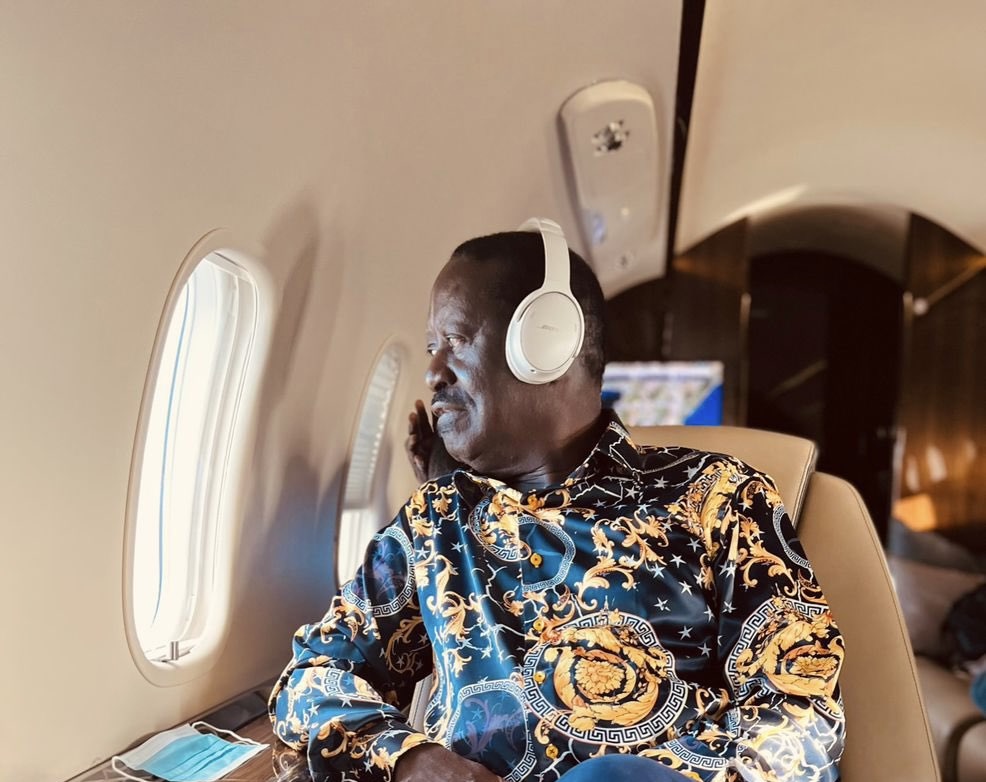Politics
Private Jets, Luxury Hotels: How Kenya Blew Sh524M on Raila’s Failed AUC Bid

New information presented before Parliament has revealed that Kenya spent Sh523.85 million on Raila Odinga’s unsuccessful campaign for the chairmanship of the African Union Commission (AUC).
The Defence, Intelligence, and Foreign Relations committee detailed on Monday how taxpayers’ money was spent on chartering aircraft, securing hotel accommodations, arranging airport transfers, and promoting Odinga’s candidacy across the continent.
Committee Chairman Nelson Koech (Belgut, United Democratic Alliance) presented the figures to the National Assembly’s Liaison Committee, chaired by Deputy Speaker Gladys Boss, during a review of the Sh199 billion Supplementary Budget II for 2024/25.
“The committee approves spending of Sh523.84 million for the State Department for Defence, Intelligence and Foreign Affairs, incurred in accordance with Article 223 of the Constitution,” Koech told the committee, convened at the Trade Mark Hotel in Nairobi.
Article 223 allows the government to withdraw funds from the Consolidated Fund Services (CFS) for emergencies without prior parliamentary approval, capped at 10% of the annual budget, with retrospective consent required within two months.
Koech specified that the funds supported “international candidatures activity,” particularly the AUC campaign, which saw Odinga, the Orange Democratic Movement (ODM) leader and former Prime Minister, lose to Djibouti’s Foreign Minister Mahamoud Ali Youssouf in February 2025.
The election, held during the 38th AU Summit in Addis Ababa, ended with Youssouf securing the required 33 votes in the seventh round, after Odinga dropped out following the sixth round with 22 votes to Youssouf’s 26.
“We were sure we would win, but other factors came into play,” Odinga remarked after the loss, hinting at unforeseen influences despite robust backing from President William Ruto and the Foreign Affairs Ministry.
The disclosure puts to rest earlier speculation about the campaign’s cost, which had sparked heated debate. Juja MP George Koimbori had alleged the government spent Sh13 billion, a claim dismissed by Odinga and the administration as baseless.
Koimbori faced arrest and questioning by the Directorate of Criminal Investigations (DCI) in February, though he was charged with forgery rather than his spending assertions.
Speaking on February 24 at Mombasa State House, Odinga clarified that state support was limited to necessary transport, refuting extravagant expenditure rumors.
Public scrutiny intensified with a petition by Nairobi lawyer Lempaa Suyianka, who sought to block state funding for the bid, arguing it breached constitutional principles on public resource use. While the Sh523.85 million figure is significantly lower than Koimbori’s claim, it still raises questions about fiscal priorities amid Kenya’s economic challenges.
The spending revelation coincides with the broad-based government’s surprising political twist: a Memorandum of Understanding (MoU) signed between Ruto and Odinga on March 7, 2025, at the Kenyatta International Convention Centre (KICC).
The 10-point agreement, aimed at fostering national unity, commits the Kenya Kwanza coalition and ODM to collaborate on issues like implementing the Nadco report, curbing government opulence, and addressing youth employment.
The pact follows Ruto’s full-throated support for Odinga’s AUC bid, signaling a shift from rivalry to cooperation.
Critics, have long argued Odinga’s candidacy was more about political prestige than AUC reform, reflecting Kenya’s tendency to project domestic agendas onto the continental stage.
The Sh524 million expenditure, while consistent with past campaigns like the 2017 bid for Amina Mohamed, underscores ongoing debates over transparency and resource allocation.
Kenya Insights allows guest blogging, if you want to be published on Kenya’s most authoritative and accurate blog, have an expose, news TIPS, story angles, human interest stories, drop us an email on [email protected] or via Telegram
-

 Grapevine2 weeks ago
Grapevine2 weeks agoRussian Man’s Secret Sex Recordings Ignite Fury as Questions Mount Over Consent and Easy Pick-Ups in Nairobi
-

 News1 week ago
News1 week agoTHE FIRM IN THE DOCK: How Kaplan and Stratton Became the Most Scrutinised Law Firm in Kenya
-

 Investigations1 week ago
Investigations1 week agoMulti-Million Dollar Fraud: Three Kenyans Face US Extradition in Massive Cybercrime Conspiracy
-

 Economy1 week ago
Economy1 week agoIran Demands Arrest, Prosecution Of Kenya’s Cup of Joe Director Director Over Sh2.6 Billion Tea Fraud
-

 Business1 week ago
Business1 week agoA Farm in Kenya’s Rift Valley Ignites a National Reckoning With Israeli Investment
-

 Africa2 weeks ago
Africa2 weeks agoFBI Investigates Congresswoman Ilhan Omar’s Husband’s Sh3.8 Billion Businesses in Kenya, Somalia and Dubai
-

 Grapevine4 days ago
Grapevine4 days agoA UN Director Based in Nairobi Was Deep in an Intimate Friendship With Epstein — He Even Sent Her a Sex Toy
-

 Politics2 weeks ago
Politics2 weeks agoSifuna, Babu Owino Are Uhuru’s Project, Orengo Is Opportunist, Inconsequential in Kenyan Politics, Miguna Says
















